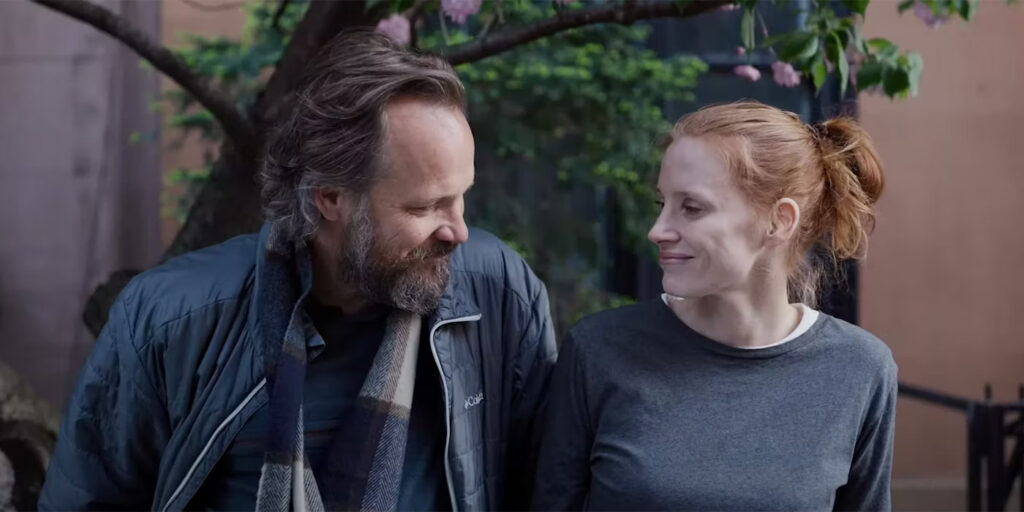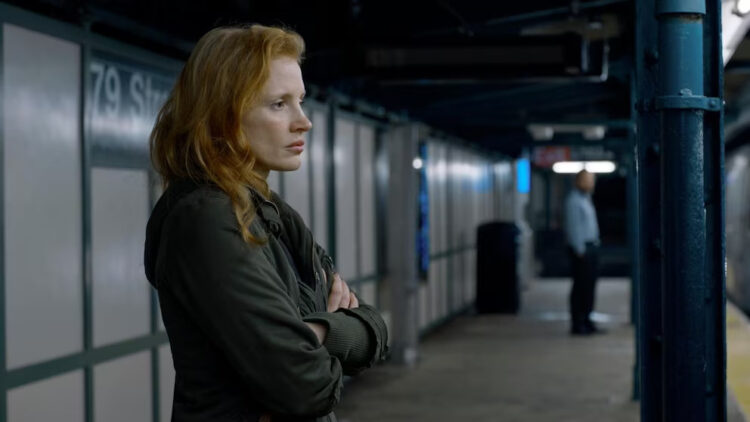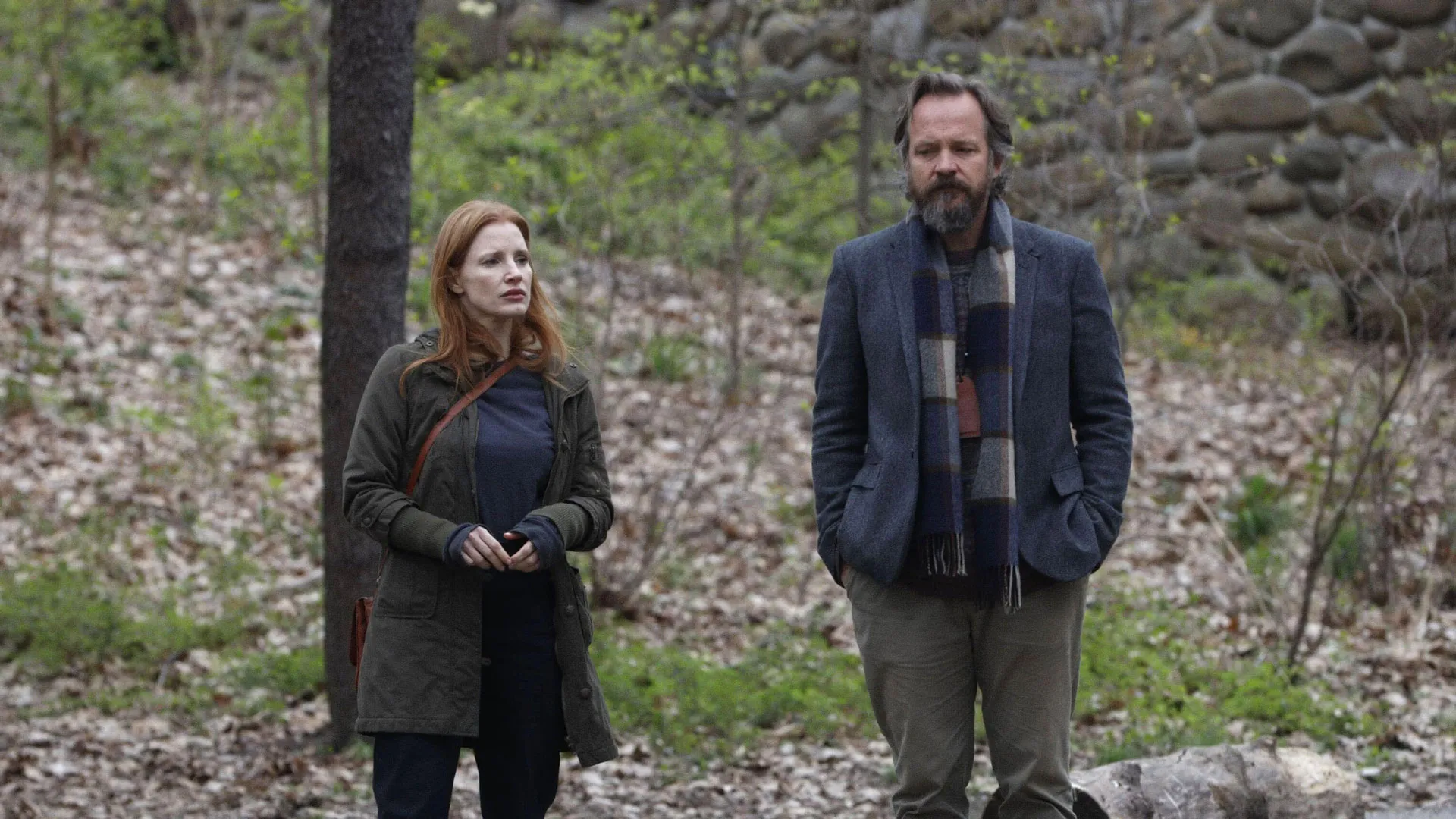The 2023 movie year saw a return to love stories as screen couples tested the axiom that all great unions must be equally fraught with despair. From Past Lives’ star-crossed soul mates to Maestro’s nontraditional marriage and All of Us Strangers’ spectral comforts to Killers of the Flower Moon’s commitment upended by crime, it was a challenging year for beloveds who couldn’t quite make things work.
Perhaps the most determined recent paramours are played by Jessica Chastain and Peter Sarsgaard in Mexican filmmaker’s Michel Franco’s searing Memory, about a pair of troubled individuals—a social worker with a haunted past and a man with early onset dementia—who, despite worlds outside and inside that conspire otherwise, try to forge a rough hewn connection.
Franco’s raw nerve drama, made on a low budget and shot largely on the streets of Brooklyn, gives both actors space to explore challenging psychological terrain in a picture taking a tough, but hopeful, look at the possibility for an unlikely alliance to heal. For the filmmaker, an austere, often bleak stylist (New Order, Chronic), Memory finds him working in an unusually compassionate key in a movie about abuse, trauma and the mysterious power of memory—confronting it, living in it, the inability to rely upon it and trying to overcome it. Franco, this time, has his characters’ best interests at heart.
It helps that the filmmaker has partnered with the dynamic Chastain, ever the chameleon across more than a decade of diametrically opposed characters, who absolutely propels his study of a recovering alcoholic social worker living with the spoils of childhood abuse. The actress plays the role not so much as an open wound, but rather one that eventually has its scab ripped away. Minus make-up and emotionally stripped to the bone, Chastain doesn’t exactly wear her character’s trauma on her sleeve but at arm’s length and just below the surface, always lurking, tugging and threatening to pull her down. How she accomplishes this feat is acting as naturalism at its best.
We first meet Sylvia (Chastain) in an AA meeting where we learn that she is a longtime sober alcoholic in recovery, and has a thirteen-year-old daughter named Anna (a terrific Brooke Timber); thirteen years also happens to be the exact tenure of her sobriety. The circumstances driving her addiction and recovery will be revealed later, in measured calibration, and as required. Sylvia and Brooke live a modest, quiet life in a ruggedly urban, Brooklyn walk-up apartment in Sunset Park adjacent to a tire shop and a world away from the cushy, upper middle class world of her caring sister, Olivia (Merritt Weaver). The apartment itself is protected by a barrage of locks which Sylvia obsessively keeps bolted, so much so that when a repair man is coincidentally sent to the unit—rather than the repair woman she requested—the notion of unlocking her home to a strange man is a terrifying proposition.

Sylvia keeps a job as a caregiver in an adult mental health home where she conveys open empathy to residents, but outside of work she projects the armored veneer of a survivor; no one is getting close. Her daily life is a model of banal cover, getting by under the radar, dragging herself up each morning, shuttling off to work (a nurturing job to feel needed), stopping at the support group, cooking dinner for Anna and then doing it all over again in an effort to keep busy (there’s a telling late moment of mere vacuuming that speaks to this filling up of time); this regimented veneer of ordinariness keeps the demons of her past at bay.
Reluctantly attending a high school class reunion, elusive Sylvia is followed home by the mysterious Saul (Sarsgaard), whom she initially seems convinced is a sexually abusive former classmate. But after spending the rainy night on the sidewalk outside her apartment, we learn that he is suffering from early onset dementia, rendering him frequently foggy and prone to blackouts and memory loss; if he did participate in any past abuse he claims not to remember such. Did such past transgressions actually occur, or are Sylvia’s memories merely projections of her own deep seated trauma? Like Sylvia, Saul is a prisoner, both of his mind and his living situation, a form of monitored lockdown by his protectively demonstrative brother, Isaac (Josh Charles).
Curious Sylvia arranges a walk in the park with Saul the next day, where she confronts him about her painful memories, which he denies. But after leaving him effectively stranded, her caretaker instincts pull her back to him and surprisingly, the pair slowly move toward a cautious friendship. Upon tentatively becoming his daily steward their relationship deepens to one of sexual intimacy and emotional support. Through the perfect pairing of Chastain and Sarsgaard, it is immensely gratifying seeing this pair of lonely, troubled individuals slowly awaken to each other, forming an unusual family bond with young Anna over pizza and game nights, the perceptive teen keenly aware of the relationship’s impact on her closed down mother.
Into this small progress comes a surprise wrench in the form of Sylvia’s imperious, surface perfect mother, Samantha, played with cool relish by a viperous Jessica Harper, great to see back in a plum role and tearing into limited screen time with galvanic force. But does Samantha hold the key to Sylvia’s childhood claims?

In a family confrontation told in a master shot (much like the Thanksgiving day argument in Maestro) Franco unleashes a single take, torrential truth telling showdown that feels slightly misjudged in its objective camera; if ever there was a moment to go in for a close-up of Chastain it would be here, and the minimalist approach, which smartly eschews overdramatizing the moment’s inherently powerful admissions, perhaps also reduces its impact by shooting intense material from across a crowded living room. The point is clear—the revelations will impact everyone in the family and all are captured in the frame—but Chastain has earned this moment and should have been close in frame.
Chastain, the Streep heir apparent unparalleled by contemporaries across her accomplished array of modern and period screen characters of different national and international identities, here conveys an piercing emotional realism of the kind she brought to 2022’s marathon HBO adaptation Scenes from a Marriage. In Memory, the Oscar winner’s toolkit here is less performing than peeling back, gradually showing us what lies beneath Sylvia’s self-protective veneer, building and deconstructing the character via minutiae—a momentary flick of her hair, cautious sideways glance or recessive posture on a crowded subway train—that projects multitudes.
For anyone who saw her as Nora in last year’s bravura Broadway revival of A Doll’s House (where I did from mere feet in the orchestra center front row), during which she never left centerstage in a production eschewing nearly all theatrical accoutrements, Chastain works here in a similarly minimalist realm sans a shred of theatricality. And Sarsgaard nearly matches her in suggesting a tamped down lost soul, but one not without the capacity for connection; the actor’s ability to morph within a single scene from miles away gaze to emotional clarity impresses. His Saul can’t trust himself or his recollections and therefore we cannot either, and the actor richly coveys this paradox; that we feel as much for him as we do given the in the moment-ness of his character is a testament to Sarsgaard’s ability to conjure Saul’s fragile humanity locked inside an increasingly dense mental labyrinth.
Franco wisely avoids crafting Memory as a pat exercise in how psychologically challenged individuals are somehow better adjusted to the world than “normal” people, able to see its absurdities and contradictions more clearly (we’ve seen that movie many times). Instead, it opens a sobering window into the vortex of everyday struggles victims endure—the basics of holding a job, integrating with family and trying to find moments of respite from pain and past—all while achieving little catharsis. It asks us to consider the concept of memory and its fallibility as well as its dual tenets of imprisonment and freedom.
Memory is a profound story told in low key realism with a pair of performances that convey compassion for those lost, shouldering the crushing weight of invisible worlds. In Franco’s most empathetic film, they just may find a way back.
3 stars




Thrilling review of a brilliant piece of film making. Thank you
Hi Dee- Thanks for this nice comment and I am glad you enjoyed the piece! Happy New Year! -Lee
And WHERE is this showing? In a string of art houses for five days before streaming, or just plain streaming?
Hi Gary- Thanks for your comment here. The film was released in early January for a limited run (about two weeks here in Chicago, including AMC venues) but is now streaming. You can see the platforms here: Memory. -Lee